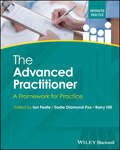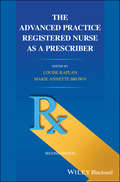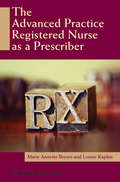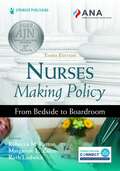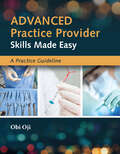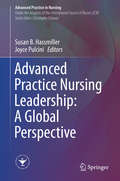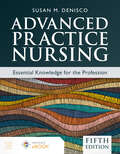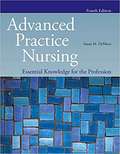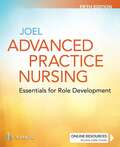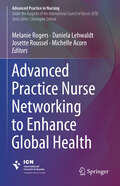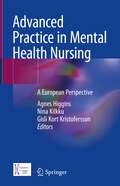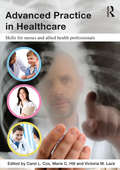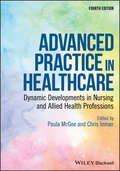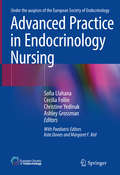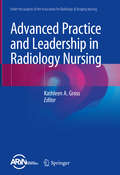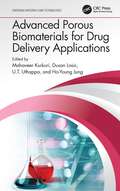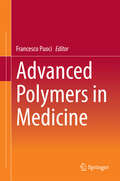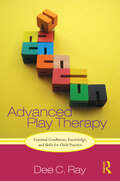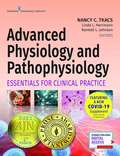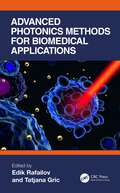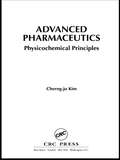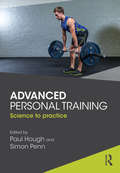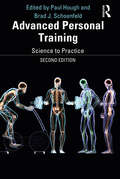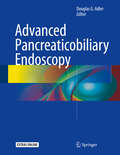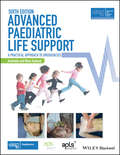- Table View
- List View
The Advanced Practitioner: A Framework for Practice (Advanced Clinical Practice)
by Ian Peate Sadie Diamond-Fox Barry HillThe Advanced Practitioner An essential text for Advanced Practitioners In The Advanced Practitioner: A Framework for Practice, a team of distinguished Advanced Practitioners (APs) and academics deliver the go-to text for trainee APs, with a strong focus on the four pillars that underpin advanced practice: clinical practice, education, research, and leadership. The patient is at the core of this essential resource, which offers the knowledge required to care safely for people in a variety of care settings, as well as with a range of common and specialised holistic interventions. Readers will also find: A thorough introduction to the core principles of advanced practice, including the AP curriculum and the principles of physiology, pharmacology, and pathophysiology Comprehensive exploration of the clinical pillar, including discussions of clinical history taking and physical examination Practical discussion of the education and research pillars, including an exploration of research principles and education and learning Discussion of innovation in practice, the leadership pillar, and how to deal with difficult situations Perfect for trainee advanced practitioners, The Advanced Practitioner: A Framework for Practice will also benefit healthcare students and trainee medical associate professionals.
The Advanced Practice Registered Nurse as a Prescriber
by Louise Kaplan Marie Annette BrownThe Advanced Practice Registered Nurse as a Prescriber is an authoritative reference guide designed for students and practicing APRNs alike—delivering the evidence-based information required for informed and ethical prescribing of medication in various clinical settings. Now in its second edition, this comprehensive book offers up-to-date coverage of all critical aspects of the prescriber role, including legal and regulatory responsibilities, managing difficult patient situations, assessing and addressing special considerations with controlled substances, and more. Drawing upon their clinical and professional experience, this respected team of authors provide clear and straightforward information based on current research and reliable evidence, helping readers identify and avoid common prescribing mistakes and pitfalls whilst presenting specific strategies to respond appropriately to an array of typical clinical experiences. This revised edition includes new and expanded chapters with information on authorizing medical marijuana, prescription monitoring programs, electronic prescribing, pharmacogenetics in prescribing and patient response, and issues surrounding controlled substance prescribing and prescribing for opioid use disorder. This leading single-volume resource: Addresses the opportunities, challenges and responsibilities that APRNs face as prescribers Covers the laws, regulations, and professional issues that affect prescribing Discusses global approaches to registered nurse and APRN prescribing such as task sharing, formularies, and independent authority Guides APRNs through difficult clinical situations such as patients seeking controlled substances and requesting inappropriate care Navigates the multiple facets of prescribing controlled substances Examines the role of the APRN in states with medical marijuana laws Serves as a resource to engage in advocacy for fully autonomous prescribing The Advanced Practice Registered Nurse as a Prescriber is essential reading for APRN and pharmacotherapeutics students, registered nurses transitioning to the role of APRN prescriber, and all APRNs including Nurse Practitioners (NP), Clinical Nurse Specialists (CNS), and Certified Registered Nurse Anesthetists (CRNA).
The Advanced Practice Registered Nurse as a Prescriber
by Louise Kaplan Marie Annette BrownA new era of opportunity is emerging for advanced practice registered nurses (APRNs) to increasingly address gaps in access to quality healthcare. APRNs must be prepared to practice to the full scope of their education and abilities. As more and more states pass legislation enhancing prescriptive authority and fully autonomous practice for APRNs, a comprehensive resource on prescribing practices is needed.The increasing demands of today's fast-paced healthcare environment require a new level of prescriber expertise. Knowledge about medication characteristics and effectiveness must be accompanied by an understanding of the context and process of prescribing. The Advanced Practice Registered Nurse as a Prescriber provides practicing APRNs and students with the information necessary to make fully informed, rational and ethical decisions as prescribers.This book opens with an overview of the role of the APRN prescriber and moves on to discussing practical issues such as managing difficult patient situations, special considerations when prescribing controlled substances, the influence of pharmaceutical marketing, state regulation, and legal aspects of prescribing. The book also examines barriers to prescribing, and the concluding chapter underscores key information to build cultural competence when prescribing.An evidence-based resource for all APRNs and APRN students, The Advanced Practice Registered Nurse as a Prescriber provides a comprehensive and practical resource essential for APRNs in all advanced practice roles.
Advanced Practice Psychiatric Nursing: From Bedside To Boardroom
by Rebecca M. Patton Margarete L. Zalon Ruth LudwickAdvanced Practice Provider Skills Made Easy: A Practice Guideline
by Obi OjiAdvanced Practice Provider Skills Made Easy: A Practice Guideline is an easy-to-follow procedural guide designed to prepare advanced practice providers to perform primary care procedures safely and competently within their scope of practice. Authored by a practicing nurse practitioner, academician, and entrepreneur who teaches clinical procedures and skills using simulation, this unique book offers hands-on clinical skills based on the latest evidence-based research. The clear step-by-step instructions and practical framework of the need-to-know information, make Advanced Practice Provider Skills Made Easy: A Practice Guideline a convenient and must-have resource for clinicians.
Advanced Practice Nursing Leadership: A Global Perspective (Advanced Practice in Nursing)
by Susan B. Hassmiller Joyce PulciniThis book is distinctive in its focus on Advanced Practice Nursing leadership globally. It has a unique structure, first highlighting global APN leadership and then including case studies on leadership from various regions around the world. This beneficial and practical book has a specific emphasis on academic, clinical and policy leadership and is relevant for all readers. Finally, a section on leadership development focuses on coaching and mentoring, business acumen, collaboration and patient advocacy provides an important contribution.Authors are distinguished APN leaders from around the world along with junior authors who are emerging leaders being mentored by these leaders.This book will appeal to APN clinicians, students and emerging leaders who want to bring important global lessons to their work. The book will become an indispensable part of the libraries of all APN leaders at all stages in their development worldwide.
Advanced Practice Nursing: Essential Knowledge for the Profession
by Susan M. DeNiscoAdvanced Practice Nursing: Essential Knowledge for the Profession, Fifth Edition is a core advanced practice text used in both Master's Level and DNP programs. Along with original chapters, this bestselling text is a thoughtfully crafted compilation of existing chapters from a variety of advanced practice nursing textbooks from Jones & Bartlett Learning. The strength of this approach is that each chapter was written by experts in each of the content areas, creating a comprehensive and well-rounded resource for the advanced practice nursing student. The Fifth Edition is framed around the new Domains from the AACN Essentials for advanced practice education as well as the Essentials for Doctoral Education featuring the most up-to-date content on each set of Essentials. Thoroughly updated, the authors address current and emerging trends, including emergency preparedness, financing health care, the impact of big data on healthcare outcomes, ethical leadership, and more timely topics.
Advanced Practice Nursing Essential Knowledge For The Profession
by Susan M. DeNiscoAdvanced Practice Nursing: Essential Knowledge for the Profession, Fourth Edition is a core advanced practice text used in both Master's Level and DNP programs. Similar to the previous edition, The Fourth Edition is framed around the AACN's Master's Essentials as well as the Essentials for Doctoral Education featuring the most up-to-date content on each set of Essentials. Throughout the Fourth Edition the authors address the rapid changes in the health care environment with a special focus on health care finance, electronic health records, quality and safety as well as emerging roles for the advanced practice nurse. Patient care in the context of the advanced nursing role is also discussed.
Advanced Practice Nursing: Essentials for Role Development
by Lucille A. Joel F. A. DavisMeet all the challenges of professional practice—whatever your specialty or environment. Noted nursing professionals and educators explore all of the non-clinical roles and responsibilities of an Advanced Practice Nurse and chart a course that enables you to meet them successfully. <p><p>You’ll follow the evolution of the APN’s role from a historical perspective to the present and examine the issues and challenges you’ll encounter in the future.
Advanced Practice Nurse Networking to Enhance Global Health (Advanced Practice in Nursing)
by Melanie Rogers Daniela Lehwaldt Josette Roussel Michelle AcornThis book is the first bringing together the work of the ICN NP/APN Network, recognised as the leading authority on advanced practice nursing globally. Since its inception a wide range of projects have been conducted. This book offers readers an overview of global developments led by the Network on advanced practice in addition to findings related to education, research, health policy and clinical practice. This volume recognises the benefits and challenges associated with the development of advanced practice nursing globally. It begins with an overview of the Network before discussing some of the global challenges. The second section of the book presents a variety of the Network's projects and evidence informed data on APN role. This book presents the global context of advanced practice in a variety of settings; As such it is relevant for APNs, students, health policy makers, educators and researchers.
Advanced Practice in Mental Health Nursing: A European Perspective
by Agnes Higgins Nina Kilkku Gisli Kort KristoferssonThis textbook explores issues central to the provision of recovery-orientated care based on ethical principles and human rights perspectives. Written by academics and nurse practitioners, this comprehensive text draws together theory, research and practice to map the landscape of Advanced Practice in Mental Health Nursing (APMHN) in Europe. Underpinned by a rights- and relational- based approach to care, the textbook is organized around six themes: theoretical and historical perspectives; foundations for collaborative working; therapeutic engagement in different contexts; beyond the clinical dimension of the APMHN role; advancing the evidence-based practice agenda and emerging issues and challenges. Each theme consists of a number of chapters that are designed to address different aspects of APMHN. With a focus on illuminating the collaborating aspect of their role and advancing nurses’ competencies, debates and guidance are provided in areas such as therapeutic alliance, assessment, care-planning, mental health promotion, family work, trauma, diversity and culture, spirituality, risk and uncertainty, and prescribing. In addition to addressing the leadership, education and advocacy role, specific chapters explore the APMHN role in linking evidence to practice, in the participatory generation of evidence and maintaining professional competence. With a focus on future challenges and opportunities the textbook concludes with discussion on issues, such as eMental Health and future challenges and possibilities facing APMHNs, including challenges in informing policy, democratizing services, working across service and disciplinary boundaries, collaboratively shaping the evidence agenda, as well sustaining their role into the future. Within the book theoretical debate is grounded in case studies and/or examples from across Europe. This textbook is especially relevant to Mental Health Nurses undertaking studies at the Advanced Practice level. It is also suited to all Mental Health Nurses studying at post-graduate level who wish to advance their practice irrespective of the country. Educators, researchers and policy-makers involved in the area of Mental Health and Advanced Nursing Practice along with people with lived experiences will find the text of relevance.
Advanced Practice in Healthcare: Skills for Nurses and Allied Health Professionals
by Carol Cox Marie Hill Victoria LackAdvanced Practice in Healthcare outlines the key components of advanced practice in which healthcare professionals are engaged. With a clear skills focus, it explores issues critical to providing effective enhanced care to patients whilst managing and negotiating the complexities of the healthcare delivery system. Perspectives on advanced practice are illuminated throughout the text and are designed to promote the formation of new thinking in relation to practice, education and research. The text is comprised of three sections that address different aspects of advanced practice and these in turn: Provide guidance on the development of clinical skills, including consultation, clinical decision making, holistic care, and the role of care planning in advanced practice. Explain management skills and how to manage, negotiate and monitor the complexities of the healthcare system in order to ensure the delivery of quality patient care. Clarify the professional role of the advanced practice clinician and how implementation of the role can improve the delivery of patient care. In each chapter activities are presented that assist in the development, implementation and extension of advanced level practice. This text is especially relevant to nurses, midwives and allied health professionals practising within primary and secondary care who wish to advance their practice or clarify their roles within the context of advanced practice, particularly those undertaking masters level study.
Advanced Practice in Healthcare: Dynamic Developments in Nursing and Allied Health Professions (Advanced Healthcare Practice)
by Paula McGee Chris InmanThe definitive resource for advanced practice within nursing and the allied health professions—revised, expanded, and updated throughout. Advanced practice is an established and continuously evolving part of healthcare workforces around the world as a level of practice beyond initial registration. Advanced practitioners are equipped to improve health, prevent disease, and provide treatment and care for patients in a diverse range of settings. This comprehensively revised fourth edition emphasises the importance of practice in advanced healthcare, presenting a critical examination of advanced practice roles in nursing and allied health professions through a series of learning features designed to facilitate the development of vital knowledge and skills. Advanced Practice in Healthcare presents: International developments in advanced practice as a global response to the need to modernise services, reduce costs and increase access to healthcare services Country-specific examples of advanced practitioners’ roles in delivering patient care in diverse settings The impact of advanced practice in nursing and the allied health professions Controversial issues including prescribing, regulation and credentialing, and the interface with medical practice Ethical and legal dimensions of advanced practice The preparation of advanced practitioners Advanced Practice in Healthcare is an essential resource for all students, practitioners, managers and researchers of advanced practice in healthcare.
Advanced Practice in Endocrinology Nursing
by Sofia Llahana Cecilia Follin Christine Yedinak Ashley GrossmanThis book provides a comprehensive guide for nurses practicing in any area of endocrinology and at any level of expertise. Endocrinology Nursing is a fast-developing specialty with nurses performing advanced roles and expanding their practice to run independent nurse-led services. Supported by the European Society of Endocrinology (ESE) and edited by members of the ESE Nurses Working Group, this is the first book ever published specifically for endocrine nurses. It is also an excellent resource for endocrinology specialty trainees, general practitioners, medical and nursing students, expert patients and nurses working in specialties such as fertility, osteoporosis, oncology, obesity, urology and gynaecology, who look after patients with endocrine-related disorders. This volume includes 13 sections and 69 chapters providing a comprehensive overview of adult and paediatric endocrinology but also a section on advanced practice, role development and nursing research. It has been written by an international team of more than 100 eminent nurses, physicians, surgeons, psychologists and other healthcare professionals, which makes this book a valuable resource for any multidisciplinary team. Many patient advocacy groups have contributed with case studies which emphasises the close working relationships with patients.
Advanced Practice and Leadership in Radiology Nursing
by Kathleen A. GrossEndorsed by the Association of Radiologic and Imaging Nursing (ARIN), this first of a kind comprehensive radiology nursing textbook fills a gap by addressing important subjects for patient care and professional issues, as well as, future possibilities affecting nursing practice. It serves as a resource to related nursing specialties, e.g. critical care, emergency or peri-anesthesia, and to radiologic technologists and physician assistants. The book could be used as one resource for studying for radiologic nursing certification.The textbook is subdivided into five sections that address advanced practice and leadership roles, clinical patient care topics, safety topics, including legal considerations, e.g. infection prevention and equipment. It includes a section with topics impacting the patient experience and a section on professional topics, e.g. cybersecurity, social media, research/outcomes, interprofessional collaboration, workplace violence and current trends in imaging. The authors include advanced practice providers, radiology nurse managers, educators, physicians, a physicist, a dentist, attorneys, a child life specialist, administrators and a social worker.Radiology diagnostic examinations and therapeutic procedures have become a more prominent part of patient care due to advances in technology and the ability of radiology to provide services that were traditionally done in surgery or not done because of limited knowledge. Many procedures are facilitated by the radiology nurse from initial consult to transfer to a hospital unit or discharge and follow-up. Nurses assess, monitor, administer sedation/other medications and respond to emergencies. They serve as educators, researchers, and resource personnel to the radiology department and in many instances, to the entire facility. Radiology nurses are real leaders. In order to keep up-to-date on new developments, nurses need new literature to support their clinical expertise and leadership. This book is an unparalleled resource, written by experts in their areas of interest.
Advanced Porous Biomaterials for Drug Delivery Applications (Emerging Materials and Technologies)
by Mahaveer Kurkuri Dusan Losic U. T. Uthappa Ho-Young JungAdvanced Porous Biomaterials for Drug Delivery Applications probes cutting-edge progress in the application of advanced porous biomaterials in drug delivery fields. These biomaterials offer promise in improving upon the design, cost, and creation of potent novel drug delivery systems. The book focuses on two categories: nature engineered and synthetic advanced porous biomaterials, with a wide range of low-cost porous biomaterial-based systems that have been used for the delivery of diverse drugs through in vitro/in vivo approaches. Details how advanced porous biomaterial-assisted systems improve essential properties in drug delivery applications Explains how advanced porous biomaterials systems are being used and explored to improve overall performances of drug delivery systems in mitigating a variety of diseases Emphasizes major applications in drug delivery such as controlled release, cancer therapy, and targeted delivery, and with focus on oral, topical, and transdermal applications Focuses on both naturally available and synthetic low-cost advanced porous biomaterials and their role in enhancing important parameters in drug delivery applications Accessible to readers with bio and non-bio backgrounds This book is an ideal reference for academics, researchers, and industry professionals in the interdisciplinary fields of biomedicine and biomedical engineering, pharmaceuticals, materials science, and chemistry.
Advanced Polymers in Medicine
by Francesco PuociThe book provides an up-to-date overview of the diverse medical applications of advanced polymers. The book opens by presenting important background information on polymer chemistry and physicochemical characterization of polymers. This serves as essential scientific support for the subsequent chapters, each of which is devoted to the applications of polymers in a particular medical specialty. The coverage is broad, encompassing orthopedics, ophthalmology, tissue engineering, surgery, dentistry, oncology, drug delivery, nephrology, wound dressing and healing, and cardiology. The development of polymers that enhance the biocompatibility of blood-contacting medical devices and the incorporation of polymers within biosensors are also addressed. This book is an excellent guide to the recent advances in polymeric biomaterials and bridges the gap between the research literature and standard textbooks on the applications of polymers in medicine.
Advanced Play Therapy: Essential Conditions, Knowledge, and Skills for Child Practice
by Dee RayCurrent play therapy resources offer details on how to conduct play therapy, but are limited in addressing the challenges that develop when therapists conduct play therapy with real-life clients. Using the Child-Centered Play Therapy Approach, Ray has written the first book to address these complex play therapy subjects. Topics covered include: integrating field knowledge of play, development, and theory into the advanced play therapist’s knowledge base; working with difficult situations, such as limit-setting, aggression, and parents; addressing modern work concerns like measuring progress, data accountability, and treatment planning; differentiating play therapy practice in school and community settings; and addressing complicated skills, such as theme work, group play therapy, and supervision. Ray also includes her Child Centered Play Therapy Treatment Manual, an invaluable tool for any play therapist accountable for evidence-based practice. This manual can also be found on the accompanying downloadable resources, along with treatment plan, session summary, and progress-tracking worksheets.
Advanced Physiology and Pathophysiology: Essentials for Clinical Practice
by Nancy Tkacs Linda Herrmann Randall JohnsonSpecifically designed for future healthcare providers who will diagnose, manage, and prescribe <p><p> This advanced physiology and pathophysiology text is designed to address the specific learning needs of future nurse practitioners, physician assistants, and other advanced healthcare providers caring for patients across the lifespan. Focusing on practical applications of physiology, it facilitates in-depth understanding of important pathophysiological concepts as they relate to major disorders commonly seen in clinical practice and includes comprehensive pediatric and geriatric considerations. This knowledge is crucial to providing the foundation required to be an informed and confident clinical decision maker. <p><p> The author team includes experienced clinicians and educators: nurses and nurse practitioners, physician assistants, doctors of pharmacy, physicians, and basic scientists. This collaboration has produced a text that carefully details and richly illustrates the cellular structure and function of each organ system and mechanisms of associated major clinical disorders. Uniquely interweaving aspects of organ function during healthy states with disease-associated changes, the text emphasizes and extends the basic science foundation to practical clinical applications. The text promotes a deep understanding of cellular function in health and disease that provides the bedrock knowledge required to master pharmacology for prescriptive practice. Equally important, the solid foundation of applied pathophysiological mechanisms offered in this text prepares the student clinician to care for patients with a broad variety of disorders. This resource not only provides a deep dive into pathophysiology, but it also examines why patients often present with particular symptoms, the rationale for ordering specific diagnostic tests and interpretation of results, and common management strategies that proceed from the underlying pathophysiology.
Advanced Photonics Methods for Biomedical Applications
by Edik Rafailov Tatjana GricAdvanced photonics methods for biomedical applications give researchers in universities and industries, and clinicians an overview of the novel tools for cancer diagnostics and treatment. This book provides researchers and professionals in the area of biomedical photonics with a toolbox of novel methodologies for biomedical applications, including health diagnostics, cancer detection, and treatment. It covers the theory, modeling, and design of each method, alongside their applications, fabrication, characterization, and measurements in clinical practice. A wide scope of concepts concerning innovative science and technologies of medicine will be covered, providing the readers with the latest research, developments, and technologies. It will also be a valuable resource for students and early-career researchers, alongside those involved in the design of the novel photonics-based techniques for health diagnostics and cancer detection and treatment. Key features • Discusses novel methods of cancer diagnostics and cancer treatment. • Details non and minimally invasive photonics techniques. • Explores the applications of machine learning and artificial intelligence to these novel techniques.
Advanced Pharmaceutics: Physicochemical Principles
by Cherng-ju KimDiscussing a comprehensive range of topics, Advanced Pharmaceutics: Physicochemical Principles reviews all aspects of physical pharmacy. The book explains the basic, mechanistic, and quantitative interpretation skills needed to solve physical pharmacy related problems. The author supplies a strong fundamental background and extensively covers therm
Advanced Personal Training: Science to practice
by Paul Hough Simon PennEffective fitness instruction and training programme design require an exercise specialist trainer to combine professional experience with strategies underpinned by scientific evidence. This is the first comprehensive fitness instruction and training programme design resource to explore the evidence-base of effective programme design, drawing on cutting-edge scientific research to identify optimum training methods and dispel some common myths around fitness training. Putting clients’ training goals at the centre of the process by focusing on their most common objectives – such as improving general health, enhancing cardiorespiratory fitness, decreasing body fat and increasing muscle mass – this book helps the reader develop a better understanding of the physiological principles at the core of successful programme design. Simple to navigate and full of helpful features – including applied case studies, example training programmes and guides to further reading – it covers a variety of key topics such as: pre-exercise health screening lifestyle and fitness assessment nutrition cardiorespiratory (endurance), resistance and core training recovery from exercise. An essential text for fitness instructors, personal trainers and sport and exercise students, this book provides an invaluable resource for fitness courses, exercise science degree programmes and continued professional development for exercise professionals.
Advanced Personal Training: Science to Practice
by Paul Hough Brad J. SchoenfeldEffective fitness instruction and training programme design require an exercise specialist trainer to combine professional experience with strategies underpinned by scientific evidence. This book allows readers to develop their understanding of the scientific rationale behind important components of personal training, such as monitoring fitness and training programme design. Each chapter synthesizes the findings of cutting-edge scientific research to identify optimum training methods and dispel some myths that are prevalent in the fitness industry. The chapters within this new edition have been written by internationally renowned experts from several disciplines, including strength and conditioning, physiology, psychology, and nutrition. Contributions have also been made from esteemed academics who have conducted some of the scientific studies discussed within the book. The authors have interpreted and summarised the scientific evidence and produced evidence-based recommendations, allowing readers to explore the latest concepts and research findings and apply them in practice. The book includes several new chapters, such as evidenced based practice (EBP), and designing training programmes female clients. This second edition remains the essential text for fitness instructors, personal trainers and sport and exercise students. The book provides an invaluable resource for fitness courses, exercise science degree programmes and continued professional development for exercise professionals.
Advanced Pancreaticobiliary Endoscopy
by Douglas G. AdlerThis volume provides a comprehensive guide to advanced endoscopic procedures and techniques. Primarily focused on Endoscopic Retrograde Cholangiopancreatography (ERCP) and Endoscopic Ultrasound (EUS), the book also explores related topics such as cholangioscopy, pancreatoscopy, advanced pancreaticobiliary imaging, stenting, and endoscopic means to achieve pain control. The text also presents a plethora of tips and tricks on how to perform these procedures safely, emphasizes common mistakes and how to avoid them, and features high quality videos illustrating key procedural aspects for every chapter. Written by top experts in the field, Advanced Pancreaticobiliary Endoscopy is an invaluable resource for gastrointestinal endoscopists and fellows interested in advanced endoscopic procedures.
Advanced Paediatric Life Support, Australia and New Zealand: A Practical Approach to Emergencies (Advanced Life Support Group)
by AlsgAdvanced Paediatric Life Support is the internationally renowned manual on emergency paediatric care, written to support the course run by the Advanced Life Support Group. This edition has been adapted specifically for use in Australia and New Zealand, with the latest procedures, medications and clinical best practice to match the guidelines of the Australia and New Zealand Resuscitation Councils. Using their structured approach, a tried and tested practical method of treating children during the crucial first few hours of a life threatening illness or injury, Advanced Paediatric Life Support is used by doctors, nurses and allied health professionals dealing with emergencies in children. Its clear layout and straightforward style make it a highly practical tool both for training and in the event of an emergency. The sixth edition includes major new features bringing it right up to date, including: Fully adapted for use in Australia and New Zealand, with updates to chapters on shock, the choking child, basic life support and cardiac arrest The latest International Liaison Committee on Resuscitation (ILCOR) 2015 Guidelines The latest consensus guidelines on paediatric trauma Enhanced discussions on the importance of human factors A new and improved design including full colour photographs and diagrams Free access to the Wiley E-Text With this book at hand, all those providing care during paediatric emergencies can be confident in having comprehensive and authoritative guidance on the recognition and management of life threatening conditions necessary to save a child's life.
